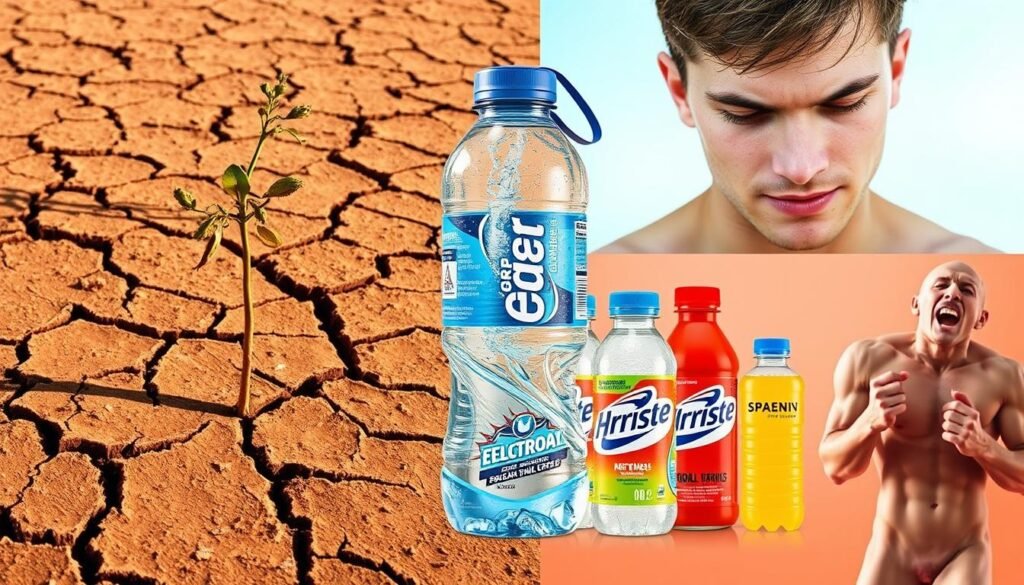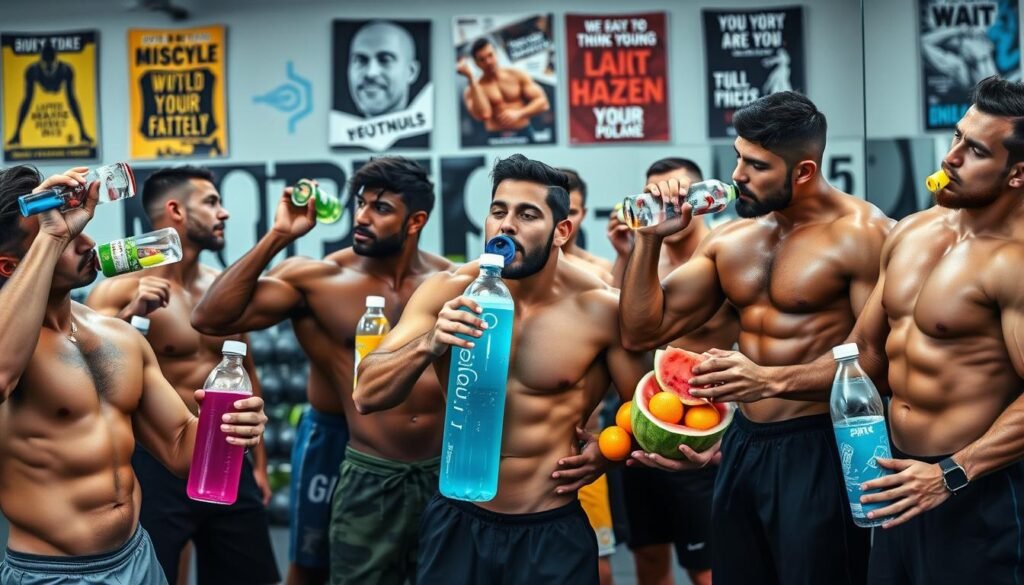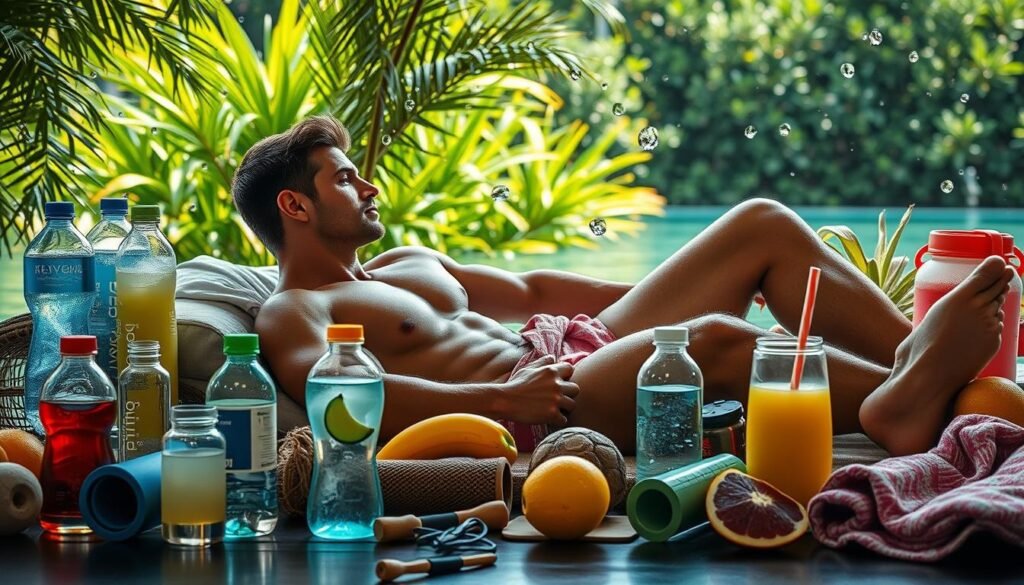About 75% of athletes get muscle cramps during hard workouts. This is usually because they are not drinking enough water. During the bulking phase, when you’re eating more to grow muscle, drinking enough becomes even more important. Not only does it help your performance, but it also aids in muscle recovery and keeps you healthy. This article will give you great tips on how to stay hydrated. This way, you can keep working out without being slowed down by muscle cramps.
Key Takeaways
- Muscle cramps affect a significant number of athletes, often linked to dehydration.
- Hydration is vital during the bulking phase for performance and recovery.
- Effective hydration strategies can enhance muscle recovery and growth.
- Incorporating nutrient-rich beverages can support caloric intake without fullness.
- Regular hydration helps prevent dehydration symptoms that can hinder workouts.
Understanding Muscle Cramps and Their Causes
Muscle cramps happen when muscles contract by themselves during activities, especially in fitness training. This can cause pain and mess up workouts. Knowing why cramps happen is essential to stop them.
Not drinking enough water is a big reason for muscle cramps. About 76% of a muscle is water, showing how important hydration is. Even a little dehydration can make workouts 25% less effective.
Electrolyte imbalances can also cause cramps. Sweating a lot means losing important minerals. This can lead to muscle cramps and feeling tired. Losing 2% of your body’s water can really affect how well you perform.
Working out too hard can bring on cramps, too. This is common when you’re trying to build muscle and eat more. If your body isn’t ready, or you don’t warm up right, you might get cramps.
Fixing these issues can help lower the chance of getting cramps. Drinking enough water helps your blood flow and brings nutrients to muscles. It also makes pain less during exercise. Knowing how to stay hydrated and prevent cramps is crucial for muscle growth.
Importance of Hydration in the Bulking Phase
When bulking up, never underestimate the importance of hydration. It’s key for muscle work and recovery, especially with higher calories. Eating more through bulking nutrition means your body needs more water. This helps use food better and get nutrients to muscles, crucial for growth.
For muscle building, picking the right hydration strategies is a must. Not enough water can make you tired, slow down recovery, and cause muscle cramps. Here’s how much water you need based on your weight:
| Weight (lbs) | Water (oz) |
|---|---|
| 120 | 60-80 oz |
| 160 | 80-100 oz |
| 200 | 100-120 oz |
Bodybuilders need to really focus on drinking enough water during their bulking phase. Being well-hydrated boosts your performance, keeps muscles working right, and can even speed up your metabolism. It’s important to follow these tips to get the best bulking results. Check out more on bulking nutrition by visiting this informative guide.
Hydration Hacks to Prevent Muscle Cramps During Bulking
During the bulking phase, staying hydrated is key to your best performance and muscle growth. To avoid muscle cramps while training hard, it’s crucial to know some hydration hacks. It’s all about Optimal Water Intake and understanding Electrolyte Balance for better hydration.
Optimal Water Intake Strategies
For bodybuilders, knowing how much water to drink is vital. If you’re on a high-protein diet, you’ll need more water to get rid of excess nitrogen and urea. Keeping your urine clear is a good sign you’re drinking enough. It’s vital to drink plenty after exercising to replace what you’ve lost and avoid muscle loss.
Experts recommend drinking 17-20 ounces of water two hours before exercise, 7-10 ounces every 10-20 minutes while exercising, and 16-24 ounces for each pound lost after exercise. These tips can help prevent dehydration and boost your performance.
Electrolyte Balance and Its Role
Electrolytes like sodium, potassium, and magnesium are essential for stopping muscle cramps when bulking. They help with hydration and make your muscles contract better. For the best outcomes, balance your electrolyte intake from food and drinks. Eating foods rich in electrolytes and drinking plenty of water maintains Electrolyte Balance. This lessens the chance of Exercise-Induced Muscle Damage (EIMD) and keeps you well-hydrated.
Dehydration Symptoms: Recognizing the Warning Signs
Knowing about dehydration symptoms is very important, especially for athletes. Catching dehydration early can stop a drop in performance. Look out for signs like:
- Thirst
- Dry mouth
- Fatigue
- Dizziness
- Confusion
- Dark-colored urine
These signs are important alerts for anyone looking to keep their hydration right. Especially during hard workouts or when building muscle. Quickly dealing with these signs by drinking more can help you stay on top of your game. Staying hydrated helps keep energy up and prevents cramps. This makes it easier for athletes to give their best performance.
How to Identify Dehydration Symptoms
It’s key for athletes and fitness fans to know how to spot dehydration. Signs like feeling dizzy, headaches, and breathing fast can show up with tiredness. Looking at the color of your pee after a tough exercise is smart. Dark pee often means you need to drink more water. To get tips on staying hydrated, you might want to check out this article. Knowing and acting on these signs helps keep your hydration in check.

The Role of Electrolytes in Muscle Function
Electrolytes are key for muscle performance, from contractions to nerve signaling. They are crucial for athletes, especially during tough training. Losing electrolytes through sweat can affect fluid balance.
Key Electrolytes to Include in Diet
For top performance and to avoid cramps, a diet with essential electrolytes is a must. These should be regularly eaten for hydration and muscle function:
- Sodium: Important for maintaining fluid balance and nerve function.
- Potassium: Found in bananas, it helps with muscle contractions and recovery.
- Calcium: Present in dairy products, essential for muscle contraction.
- Magnesium: Available in nuts, it aids in muscle relaxation and recovery.
Adding these key electrolytes to a bodybuilder’s diet can boost performance and lower cramp risks. Fluid loss during exercise can total 1 to 3 liters per hour. Keeping electrolyte balance supports energy and body functions. For long workouts, a drink with carbs and electrolytes can refill lost nutrients. Drinking water and electrolytes before working out is also wise.
Drinking fluids and replenishing electrolytes post-exercise aids recovery and hydration. For guidance on handling cramps during muscle gain, click here.
Best Hydration Strategies for Bodybuilders
Keeping hydrated is key for bodybuilders looking to boost their workout and recovery. Good hydration helps with health, strength training, and muscle growth. The right hydration methods can better workout results and shorten recovery times.
Timing of Water Intake
When you drink water is important for staying hydrated. Athletes should drink about 17-20 ounces of water 2-3 hours before exercising. Also, drinking 8 ounces of water 20-30 minutes before working out is recommended. This helps enhance performance.
Keep up with drinking 7-10 ounces of water every 10-20 minutes during exercise, especially for long sessions. After working out, you should drink 16-24 ounces of water for every pound you lose. This helps with recovery, muscle hydration, and replenishment.
Pre- and Post-Workout Hydration Tips
Effective hydration tips can really make a difference for bodybuilders. Drink plenty of water before exercising to help get oxygen to your muscles. After exercising, drink enough water to avoid dehydration and muscle cramps. Eating foods like watermelon and cucumbers also helps because they are full of water and nutrients needed for recovery. These steps can help improve your performance and muscle recovery.

Being consistent with hydration can lead to better workouts and muscle growth. For more on the importance of staying hydrated during training, read this study on hydration strategies and bodybuilding.
Foods That Enhance Hydration
Staying hydrated is very important for muscle function, especially when you train hard. Adding Foods That Enhance Hydration to a bodybuilder’s diet helps a lot. It’s good to eat fruits and veggies that have lots of water. Also, drink fluids that hydrate you well for the best results.
Fruits and Vegetables with High Water Content
Some fruits and veggies are great for hydrating and giving important nutrients. Here are the best choices:
- Watermelon: It’s about 92% water and really good for you.
- Cucumber: This veggie is 95% water, very refreshing, and doesn’t have many calories.
- Strawberries: Juicy and made up of 91% water.
- Oranges: They help hydrate you and give a vitamin C boost.
Hydration-Rich Beverages
Drinking certain fluids can also help keep you hydrated. Here’s what’s recommended:
- Coconut water: Full of natural electrolytes, great for after workouts.
- Sports drinks: They are made to replace what you lose when you sweat a lot.
Adding these Fruits and Vegetables with High Water Content and Hydration-Rich Beverages to what you eat and drink every day can really help. It makes you more hydrated and improves how well you do in your workouts. For tips on what to eat for bodybuilding, go check out this resource.
| Food Item | Water Content (%) | Benefits |
|---|---|---|
| Watermelon | 92 | Hydrating, rich in antioxidants |
| Cucumber | 95 | Low-calorie, refreshing snack |
| Strawberries | 91 | High in vitamins, dietary fiber |
| Orange | 86 | Vitamin C, boosts immunity |
| Coconut Water | N/A | Electrolyte replenishment |
| Sports Drinks | N/A | Replenishes electrolytes |
Muscle Recovery and Hydration Connection
Hydration is key to muscle recovery after hard workouts. It helps fix and refresh muscles and refill energy stores. For bodybuilders during their bulk-up phase, staying hydrated is crucial. The importance of hydration for recovery goes beyond just drinking water; it helps move nutrients for muscle repair.

The International Society of Sports Nutrition (ISSN) suggests taking in 20 to 40 grams of protein every few hours. You should also eat 3.6 to 5.5 grams of carbs per pound of body weight. This approach boosts energy stores and helps muscles grow and avoids injury.
Not drinking enough after working out can cause muscle cramps, tiredness, and poor performance. The National Athletic Trainers’ Association (NATA) has a guide: drink 500 to 600 ml of water before workouts. Then, have 200 to 300 ml of water 10 to 20 minutes after finishing. This plan keeps the hydration connection that’s crucial for muscle recovery.
Rest is just as crucial for full recovery. People need seven to nine hours of sleep per night for their bodies to heal. Adding enough rest days, like mixing strength and cardio days, helps the body recover properly. This way, you can keep improving without overdoing it, linking hydration and muscle recovery closely.
Common Misconceptions About Bulking Nutrition
Many people have Common Misconceptions about bulking nutrition. They think all calorie-dense foods help in muscle gain. This leads them to choose foods poorly, ignoring nutrient quality. For good results, focus on foods rich in nutrients, not just high in calories.
Some believe just eating more carbs is the key to gaining muscle. Yet, studies show adding protein can lead to slightly more muscle than carbs alone. So, a balanced diet with proteins, carbs, and healthy fats is best for Bulking Nutrition.
There’s a false idea that supplements alone build muscle fast. While creatine can boost muscle content by up to 40%, it’s not enough on its own. Women using creatine, especially during hormonal shifts, need a nutrient-rich diet too.
The table below clears up some wrong beliefs about bulking nutrition:
| Misunderstanding | Fact |
|---|---|
| All calorie-dense foods are beneficial for bulking. | Nutrient-dense foods are crucial for muscle gain and preventing excess fat. |
| Only carbs matter for gaining muscle. | Protein intake is vital for muscle growth, and more protein can yield better results than carbs. |
| Supplements alone can significantly enhance muscle growth. | Supplements are effective only when part of a comprehensive nutrition strategy. |
| Weight gainers are solely high-calorie products. | Some weight gainers contain over 1,000 calories per serving, mostly from carbs, not a balanced intake. |
Knowing the truth about these Misunderstandings about Bulking can help you plan your nutrition better. Keeping a balanced diet is key. Quality and quantity of what you eat are important for bulking up and growing muscle.
Conclusion
For bodybuilders in their bulking phase, getting their hydration right is key to avoiding muscle cramps. This article has shown some hydration tips that can really boost performance and recovery. Staying hydrated helps muscles work better and makes workouts more effective.
Keeping a good balance of electrolytes and knowing when you’re getting dehydrated is important. Bodybuilders can protect their health and get the most from their workouts by doing this. By eating right and hydrating at the right times, you can see better results. This is without the downsides of dirty bulking.
A strong commitment to hydration and nutrition leads to meeting fitness goals. Building muscle isn’t just about lifting heavy weights. It’s also about the key roles of nutrition and hydration in getting results.